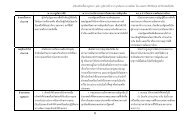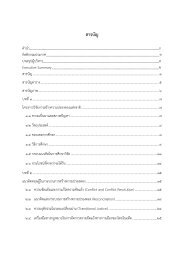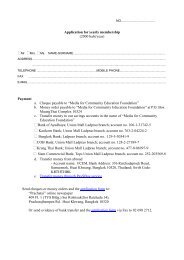Burma Review 2013, Aung Din (Final).pdf
Burma Review 2013, Aung Din (Final).pdf
Burma Review 2013, Aung Din (Final).pdf
You also want an ePaper? Increase the reach of your titles
YUMPU automatically turns print PDFs into web optimized ePapers that Google loves.
Lapadaung Copper Mine in Monywar, Upper <strong>Burma</strong> 6 , and the <strong>Burma</strong> army’s increased offensives at<br />
Liaza, KIO Headquarter at China-<strong>Burma</strong> border, with the help of fighter jets and attack helicopters.<br />
We all wish <strong>Burma</strong> is better in <strong>2013</strong> and beyond. However, there are many challenges and obstacles<br />
ahead. There are three major areas without any changes. First, the judiciary system is still not<br />
independent and impartial. It is still working to serve the pleasure of the regime. Incompetent judges are<br />
running “kangaroo courts” with the support of corrupt and abusive law enforcement officers whose only<br />
way to get confession from the accused is detention, torture and manipulation. Many laws and decrees<br />
created by the successive military regimes to oppress democratic opposition are still active and being<br />
used. Second, the country’s economy is still dominated and controlled by the military, crony capitalists,<br />
and families of the regime. There is no chance for ordinary citizens to compete with them on a level<br />
playing field. And third, the Burmese military is still above the law and dominant in the country’s<br />
political affairs with unchecked powers. There is no sign in sight that the Burmese military will stop<br />
committing human rights violations and come under the civilian control.<br />
<strong>Burma</strong>’s Twelve Key Players<br />
Twelve key players will decorate <strong>Burma</strong> in <strong>2013</strong> with various activities, positive and negative. They are<br />
(1) President Thein Sein, (2) Lower House Speaker Shwe Mann, (3) Commander-in-Chief Deputy<br />
Senior General Min <strong>Aung</strong> Hlaing, (4) Chairperson of National League for Democracy <strong>Aung</strong> San Suu<br />
Kyi, (5) The 88 Generation Students Group, (6) Kachin Independence Organization (KIO), (7) Karen<br />
National Union (KNU), (8) United Nationalities Federal Council (UNFC), (9) United Wa State Army<br />
(UWSA), (10) crony capitalists, (11) media and (12) the peoples of <strong>Burma</strong>.<br />
Thein Sein, Shwe Mann and Min <strong>Aung</strong> Hlaing<br />
Thein Sein and Shwe Mann are former generals and powerful figures in the previous military regime,<br />
known as State Peace and Development Council (SPDC), and now serving as the President and the<br />
Speaker of the Lower House respectively, as well as leaders of the ruling party, USDP. Min <strong>Aung</strong><br />
Hlaing, who was a junior general when Shwe Mann and Thein Sein were number 3rd and 4th in the<br />
SPDC, is now serving as the Commander-in-Chief of the armed forces with Deputy Senior General<br />
Title. They are now running the three power centers, the government, the Parliament and the military,<br />
separately. Although Thein Sein is the President and the head of the government, he doesn’t own all of<br />
his cabinet. Three important ministries, Ministries of Defense, Home Affairs and Border Area Affairs<br />
are run by three generals appointed by Min <strong>Aung</strong> Hlaing. Shwe Mann is the head of the Lower House<br />
and going to become the Speaker of the Union Parliament (combination of the Lower House and Upper<br />
House) in June <strong>2013</strong>. But, he doesn’t own the whole Parliament as well. 25% of representatives in the<br />
Union Parliament are military officials appointed by Min <strong>Aung</strong> Hlaing. The 2008 Constitution provides<br />
Min <strong>Aung</strong> Hlaing to run the military independently. Among the 11 members of the country’s most<br />
powerful body, National Defense and Security Council (NDSC), Min <strong>Aung</strong> Hlaing controls six<br />
members, himself and his deputy Commander-in-Chief, three ministers for Defense, Home Affairs, and<br />
Border Area Affairs, and a Vice President Nyan Tun, appointed by Min <strong>Aung</strong> Hlaing. 7 Apparently he is<br />
the most powerful person in <strong>Burma</strong>.<br />
6 Violent Police Crackdown on Sit-in Protestors at Copper Mine, Eleven Media, January 8, <strong>2013</strong>,<br />
http://elevenmyanmar.com/top-events-2012/events/2043-violent-police-crackdown-on-sit-in-protestors-at-copper-mine<br />
7 Section 201, Formation of the National Defence and Security Council, Constitution of the Republic of the Union of<br />
Myanmar (2008)<br />
2 | P a g e







